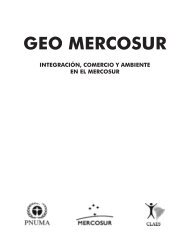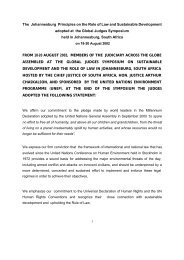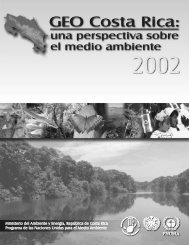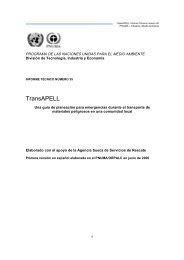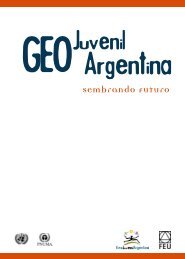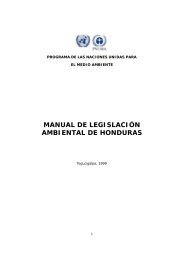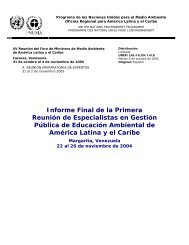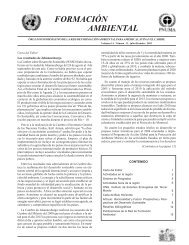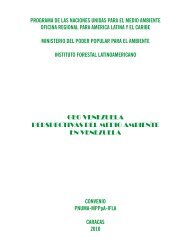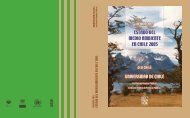GEO Haiti 2010
GEO Haiti 2010
GEO Haiti 2010
Create successful ePaper yourself
Turn your PDF publications into a flip-book with our unique Google optimized e-Paper software.
State of the Environment Report <strong>2010</strong><br />
35<br />
Executive Summary<br />
The Republic of <strong>Haiti</strong>, a territory of 27,750 km 2 ,<br />
occupies a third of the surface area of the island<br />
of Hispaniola, one of the largest in the Caribbean.<br />
The country’s capital, Port-au-Prince, includes 12<br />
townships and is home to 25% of the population<br />
of <strong>Haiti</strong>, which accounts for 63% of all urban<br />
populations within the country (IHSI, 2003a).<br />
The name « Ayiti », which means “Land of high<br />
mountains” or “The Mountain in the sea”, is derived<br />
from the language of the Tainos, the Amerindians<br />
of the insular Caribbean. Peaceful people, they<br />
were involved in agriculture, fishing and croppicking,<br />
and at the arrival of Christopher Columbus<br />
in the New World in 1492, the Spaniards called the<br />
island “Hispaniola”. Later, a division resulting from<br />
the treaty of Ryswick (1677) separated the island<br />
in two; the western portion (the future <strong>Haiti</strong>) was<br />
given to France and named Saint Domingue, while<br />
Spain retained the eastern portion.<br />
The colony of Saint Domingue experienced<br />
unequalled prosperity as one of the region’s main<br />
sugar and coffee producers, and its external trade<br />
was among France’s most profitable activities.<br />
However the organization of the colony was based<br />
on a much criticized social and economic system,<br />
which led to a revolution. This revolution represents<br />
the first successful rebellion of slaves in the modern<br />
world and resulted in the establishment in 1804 of<br />
the Republic of <strong>Haiti</strong>, as the first free black republic<br />
in the world.<br />
This country also wished to serve as an example<br />
and prove to the rest of the world that no race<br />
was inferior and that Blacks could attain a level<br />
of civilization equivalent, or even superior, to that<br />
of other races. <strong>Haiti</strong>, under Alexandre Pétion, also<br />
supported the emancipation of other American<br />
colonies under the tutelage of the Europeans.<br />
Countries such as Venezuela, Mexico, Jamaica,<br />
Cuba and the Dominican Republic benefitted<br />
from significant assistance (financial, aid in men<br />
and ammunition) from <strong>Haiti</strong>. According to Pétion,<br />
the freedom of the people of <strong>Haiti</strong> would be<br />
threatened as long as there remained enslaved<br />
populations in the Americas. The history of <strong>Haiti</strong><br />
is one of heroism and grandeur, although it is<br />
marked by a long succession of difficult political,<br />
social and economic events.<br />
For the past twenty years, <strong>Haiti</strong>’s economy has<br />
been confronting a period of turbulence and the<br />
country has faced a serious political and economic<br />
crises. The Gross Domestic Product (GDP) fell<br />
during the first half of 1990 as a result of the sociopolitical<br />
instability at that time. Calculated at nearly<br />
US$3 billion at the beginning of 1991, the GDP fell<br />
to US$2.5 billion in 1995, slightly rising to US$2.8<br />
billion in 2001.<br />
However, since 2005, an upward trend has been<br />
observed, allowing the GDP to attain a value of<br />
US$3.4 billion in 2007 (UNDP, 2007). That year, this<br />
indicator grew by 3.2% (IHSI, 2008) in relation to<br />
the previous year because of the re-establishment<br />
of a favorable economic climate. It must be noted<br />
however, that the per capita GDP, which currently<br />
stands at around US$500, has never regained the<br />
historic level of US$3,151 that it attained in 1980<br />
(UNDP, 2007).<br />
Young people account for a high proportion of<br />
the <strong>Haiti</strong>an population with more than half of<br />
the population under 21 years of age, and of this<br />
number, 36.5% under the age of 15. The population<br />
of over 65 years of age represents a mere 5.1% of<br />
the total population, and the male/female ratio<br />
shows a slight preponderance of women (51%).



